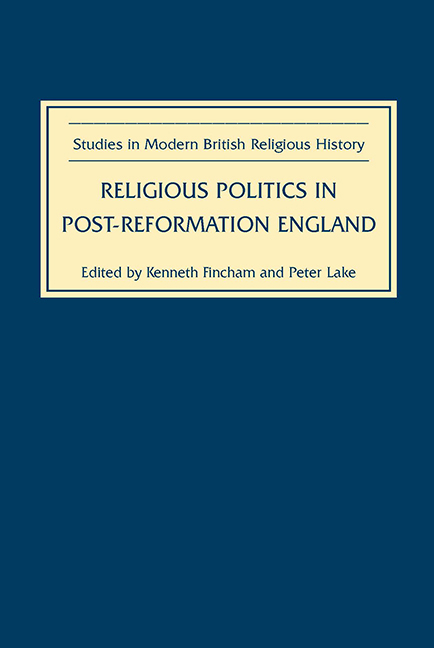Book contents
- Frontmatter
- CONTENTS
- Dedicaton
- Miscellaneous Frontmatter
- Preface
- Abbreviations
- 1 Introduction: Puritanism, Arminianism and Nicholas Tyacke
- 2 Art and Iconoclasm in Early Modern England
- 3 The Latitude of the Church of England
- 4 Joan of Contention: The Myth of the Female Pope in Early Modern England
- 5 Anti-Puritanism: The Structure of a Prejudice
- 6 The Fortunes of English Puritanism: An Elizabethan Perspective
- 7 What's in a Name? Dudley Fenner and the Peculiarities of Puritan Nomenclature
- 8 Puritan Preachers and their Patrons
- 9 New England's Reformation: ‘Wee shall be as a Citty upon a Hill, the Eies of All People are upon Us’
- 10 ‘Anglicanism’ by Stealth: The Career and Influence of John Overall
- 11 Destroyed for doing my Duty: Thomas Felton and the Penal Laws under Elizabeth and James I
- 12 Charles I and Providence
- 13 John Shawe and Edward Bowles: Civic Preachers at Peace and War
- 14 Material Evidence: The Religious Legacy of the Interregnum at St George Tombland, Norwich
- Index
- Tabula Gratulatoria
- Studies in Modern British Religious History
10 - ‘Anglicanism’ by Stealth: The Career and Influence of John Overall
Published online by Cambridge University Press: 25 October 2017
- Frontmatter
- CONTENTS
- Dedicaton
- Miscellaneous Frontmatter
- Preface
- Abbreviations
- 1 Introduction: Puritanism, Arminianism and Nicholas Tyacke
- 2 Art and Iconoclasm in Early Modern England
- 3 The Latitude of the Church of England
- 4 Joan of Contention: The Myth of the Female Pope in Early Modern England
- 5 Anti-Puritanism: The Structure of a Prejudice
- 6 The Fortunes of English Puritanism: An Elizabethan Perspective
- 7 What's in a Name? Dudley Fenner and the Peculiarities of Puritan Nomenclature
- 8 Puritan Preachers and their Patrons
- 9 New England's Reformation: ‘Wee shall be as a Citty upon a Hill, the Eies of All People are upon Us’
- 10 ‘Anglicanism’ by Stealth: The Career and Influence of John Overall
- 11 Destroyed for doing my Duty: Thomas Felton and the Penal Laws under Elizabeth and James I
- 12 Charles I and Providence
- 13 John Shawe and Edward Bowles: Civic Preachers at Peace and War
- 14 Material Evidence: The Religious Legacy of the Interregnum at St George Tombland, Norwich
- Index
- Tabula Gratulatoria
- Studies in Modern British Religious History
Summary
If we understand by ‘Anglicanism’ an assumption that the Church of England occupies a distinctive ‘via media’ between Rome and reformed protestantism, allied to a distaste for speculative theology, a strong concern with ceremonies and their value, a deep attachment to the prayer book, a reverence for patristic authority and a strong sense of continuity with the medieval past, combined with a conviction that these attitudes constitute a natural reflection of a coherent English Reformation settlement, then it has been not the least significant achievement of Nicholas Tyacke (along with historians such as Peter Lake and Patrick Collinson) to have established that much of what we think of as ‘Anglicanism’ was not present in the churchmanship of the leaders of the Elizabethan Church and state. In light of this fact some historians have begun to search for the origins of this ‘Anglicanism’ not in the Reformation settlement, but in the 1590s, either in the figure and writings of Richard Hooker or in the ‘Anglican moment’ that created him. The promoters of some of the features of later ‘Anglicanism’ were, however, a controversial minority of divines in the 1590s, who would have struggled to find earlier English protestant advocates of the richly ceremonialist ‘avant-garde conformity’ that they espoused. The process whereby these divines – Hooker, Andrewes, Howson, Saravia – became the mainstream spokesmen of an ‘Anglican’ middle ground (however distorted by the apparent excesses of the Laudian movement), nevertheless remains little studied.
In the search for the emergence of characteristically ‘Anglican’ ideas one figure is frequently left out, or simply appended to lists of early anti-Calvinists, and that is the regius professor of divinity at Cambridge, dean of St Paul's and later bishop of Coventry and Lichfield and then Norwich, John Overall. The neglect of Overall is partly owing to the fact that his recorded ideas survive only in fragmentary and dispersed materials. Nevertheless, this disparate survival has served to disguise the comprehensive range and coherence of his views, which were frequently pioneering in their anticipation of later developments. Moreover, it will be suggested here that Overall also provides us with a way into the conundrum of how the apparently marginal ‘avant-garde conformity’ of the late Elizabethan and Jacobean Church became the mainstream ‘Anglican’ position.
- Type
- Chapter
- Information
- Religious Politics in Post-Reformation England , pp. 159 - 176Publisher: Boydell & BrewerPrint publication year: 2006

